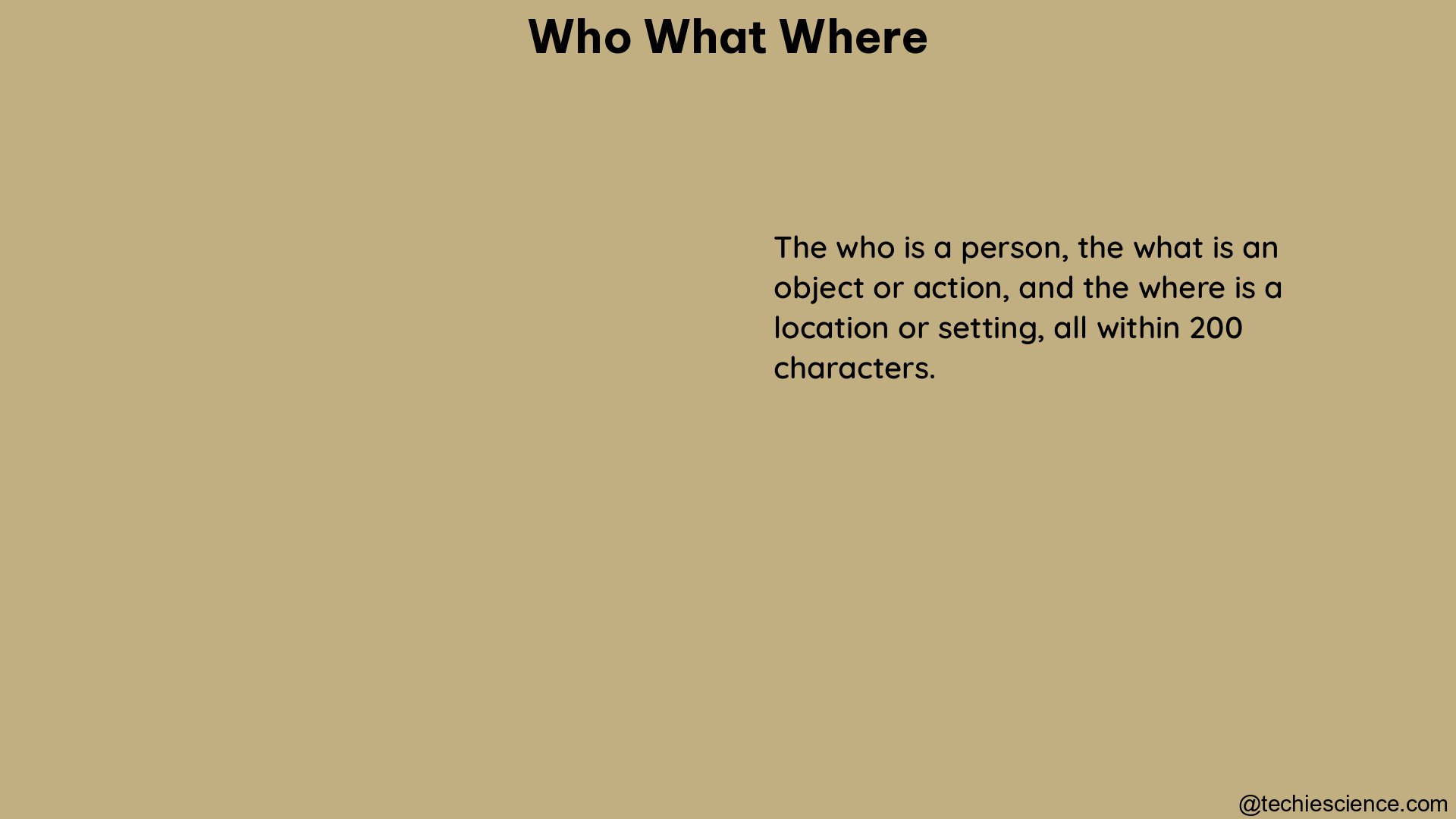The “who, what, where” questions are fundamental interrogatives used to gather comprehensive information about a particular situation or event. These questions are crucial in various contexts, including journalism, storytelling, and everyday communication, as they help to identify the key elements of a story or situation, making it easier to communicate and understand.
Who: Identifying the Participants
Definition
The “who” question refers to the person or people involved in the situation. It is used to determine the subject or subjects of the action or event.
Examples
- Who is going to the party?
- Who wrote this book?
Grammatical Specification
The “who” question typically involves a subject-verb agreement, where the verb agrees with the subject in number (singular or plural). For instance, “Who is going to the party?” or “Who are going to the party?”
Advanced Considerations
- In some cases, the “who” question may involve more complex grammatical structures, such as when asking about the agent of a passive construction: “Who was the book written by?”
- The “who” question can also be used to inquire about the identity or role of a person in a specific context, such as “Who is the CEO of the company?”
What: Identifying the Action or Event

Definition
The “what” question refers to the action, event, or thing involved in the situation. It is used to determine the object or focus of the inquiry.
Examples
- What is happening at the party?
- What did you do yesterday?
Grammatical Specification
The “what” question often involves a direct object, which is the thing or action being referred to. For instance, “What did you do yesterday?” or “What is the party celebrating?”
Advanced Considerations
- The “what” question can also be used to inquire about the nature or characteristics of something, such as “What is the weather like today?”
- In some cases, the “what” question may involve more complex grammatical structures, such as when asking about the subject of a passive construction: “What was the book written about?”
Where: Identifying the Location
Definition
The “where” question refers to the location or place where the situation is happening. It is used to determine the setting or context of the event or action.
Examples
- Where is the party?
- Where did you go yesterday?
Grammatical Specification
The “where” question typically involves a prepositional phrase indicating the location. For instance, “Where is the party?” or “Where did you go yesterday?”
Advanced Considerations
- The “where” question can also be used to inquire about the direction or path of movement, such as “Where are you going?”
- In some cases, the “where” question may involve more complex grammatical structures, such as when asking about the location of a specific object or person: “Where is the book on the shelf?”
Combining the Questions for Comprehensive Information
The “who, what, where” questions are often used together to gather more comprehensive information about a situation or event. This approach is particularly common in journalism, where the “Five Ws” (who, what, where, when, and why) are used to provide a detailed account of an event.
Examples of “Who, What, Where” in Context
Journalism
“Who was involved in the accident? What happened? Where did it occur?”
Storytelling
“Who was the main character? What was their goal? Where did they go to achieve it?”
Everyday Conversation
“Who is going to the movies? What movie are they watching? Where are they meeting?”
Theoretical Perspectives and Rhetorical Usage
Aristotle’s Perspective
In his work “Politics,” the ancient Greek philosopher Aristotle emphasized the importance of understanding the circumstances of an action, including who, what, where, when, and why. He believed that ignorance of these elements could imply involuntary action, as the agent may not have had full knowledge or control of the situation.
Rhetorical Usage
The “Five Ws” have been widely used in rhetoric to analyze and present information effectively. By identifying the key elements of a story or situation, the “Five Ws” help communicators to structure their messages in a clear and logical manner, making it easier for the audience to understand and engage with the content.
Reference Links
- https://en.wikipedia.org/wiki/Five_Ws
- https://comm.gatech.edu/resources/writers/5ws
- https://www.twinkl.com/teaching-wiki/5-w-questions

The lambdageeks.com Core SME Team is a group of experienced subject matter experts from diverse scientific and technical fields including Physics, Chemistry, Technology,Electronics & Electrical Engineering, Automotive, Mechanical Engineering. Our team collaborates to create high-quality, well-researched articles on a wide range of science and technology topics for the lambdageeks.com website.
All Our Senior SME are having more than 7 Years of experience in the respective fields . They are either Working Industry Professionals or assocaited With different Universities. Refer Our Authors Page to get to know About our Core SMEs.